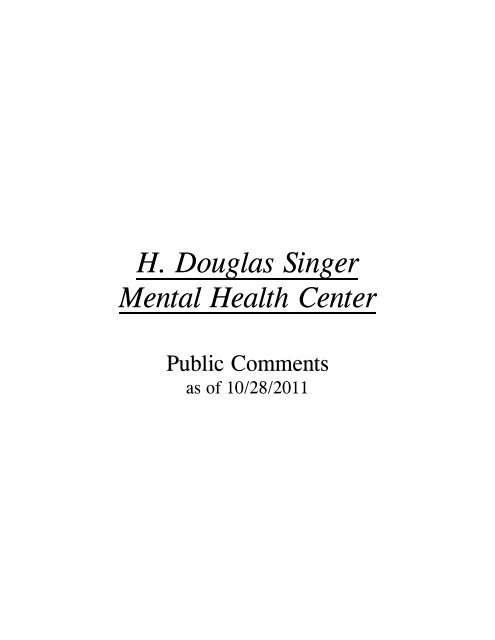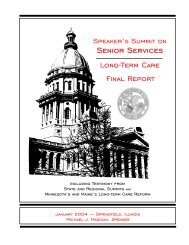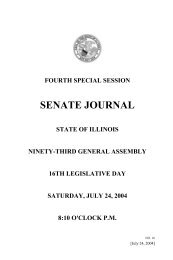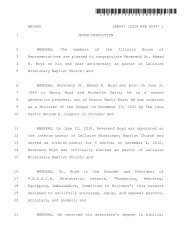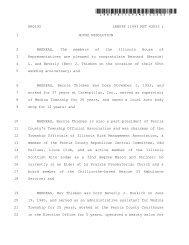H. Douglas Singer Mental Health Center - Illinois General Assembly
H. Douglas Singer Mental Health Center - Illinois General Assembly
H. Douglas Singer Mental Health Center - Illinois General Assembly
Create successful ePaper yourself
Turn your PDF publications into a flip-book with our unique Google optimized e-Paper software.
H. <strong>Douglas</strong> <strong>Singer</strong><br />
<strong>Mental</strong> <strong>Health</strong> <strong>Center</strong><br />
Public Comments<br />
as of 10/28/2011
October 25, 2011<br />
IARF Recommendations to the Commission on Government Forecasting and Accountability:<br />
Proposed Closures of Chester, <strong>Singer</strong>, and Tinley Park <strong>Mental</strong> <strong>Health</strong> <strong>Center</strong>s<br />
The <strong>Illinois</strong> Association of Rehabilitation Facilities (IARF) represents over 90 community-based providers serving<br />
children and adults with intellectual/developmental disabilities, mental illness, and/or substance use dependencies in<br />
over 900 locations throughout the state. For over 35 years, IARF has been a leading voice in support of public policy<br />
that promotes high quality community-based services in healthy communities throughout <strong>Illinois</strong>. Approximately<br />
600 licensed and/or certified community-based providers provide services and supports to over 200,000 children and<br />
adults in the community system.<br />
IARF believes that a strong network of community providers, including community mental health centers, hospitals,<br />
and crisis service providers, are integral to healthy communities in <strong>Illinois</strong>. Therefore, the Department of Human<br />
Services (DHS)’ announcement of its intent to close three state-operated mental health facilities during state fiscal<br />
year 2012 is particularly troubling, as this announcement comes at a time when the community system of care is illequipped<br />
to manage the influx of individuals with serious mental illness due to the result of significant budget cuts<br />
over the past four state fiscal years.<br />
However, IARF stands ready to work with the Administration, the <strong>General</strong> <strong>Assembly</strong>, and those legislators on the<br />
Commission of Government Forecasting and Accountability to put in place those elements that are necessary to<br />
ensure the closure of any state-operated mental health facility is done correctly and with the best interests of<br />
individuals with serious mental illness and the organizations that support them. As such, we offer the following<br />
specific recommendations below, which are more fully explored in the attached document.<br />
• Comply with P.A. 97-0438, which statutorily requires DHS’ Division of <strong>Mental</strong> <strong>Health</strong> to establish a <strong>Mental</strong><br />
<strong>Health</strong> Services Strategic Planning Task Force charged with producing a 5-year comprehensive strategic plan<br />
for mental health services by February 2013. The work of this Task Force should focus early discussions on<br />
the most appropriate role the state-operated mental health facilities should play in <strong>Illinois</strong>’ mental health<br />
system of care.<br />
• Continue funding of all state-operated mental health facilities until early recommendations by the Task Force<br />
have been put forward.<br />
• Establish networks of willing and geographically appropriate mental health providers, including hospitals<br />
and community mental health centers, per the requirements of P.A. 97-0381.<br />
• Develop adequate rates and reimbursements to cover the cost of mental health care. This should include reevaluating<br />
the Community Hospital Inpatient Psychiatric Services (CHIPS) program.<br />
• Increase community provider contract flexibility to develop aftercare and crisis programs regardless of<br />
Medicaid payor source.<br />
• Establish a jail diversion program.<br />
• Reconsider Preferred Drug List formularies<br />
If meaningful action is taken by the Administration in conjunction with the <strong>General</strong> <strong>Assembly</strong> and stakeholders on<br />
these recommendations, then IARF has full faith in our members’ ability to assist with the Administration’s policy<br />
goals of closing state-operated mental health facilities. However, until such time as these recommendations are<br />
implemented, IARF cannot support the closure of Chester <strong>Mental</strong> <strong>Health</strong> <strong>Center</strong>, <strong>Singer</strong> <strong>Mental</strong> <strong>Health</strong> <strong>Center</strong>,<br />
or Tinley Park <strong>Mental</strong> <strong>Health</strong> <strong>Center</strong> according to the timeframes or the implementation plans established by<br />
DHS in its recommendations to the Commission.
Attachment: Description of IARF’s Recommendations to COGFA: Proposed Closure of Chester, <strong>Singer</strong>,<br />
and Tinley Park <strong>Mental</strong> <strong>Health</strong> <strong>Center</strong>s<br />
Comments on the Announcements<br />
The announced closures of the Chester, H.<strong>Douglas</strong> <strong>Singer</strong>, and Tinley Park <strong>Mental</strong> <strong>Health</strong> <strong>Center</strong>s present an<br />
important opportunity for discussion on the future of services and supports for persons with mental illness in <strong>Illinois</strong>.<br />
While IARF is very familiar with the state budget development process, the approach and the timing of the<br />
announcements caught most community mental health providers by surprise. The timeframe for the announced<br />
closures, which has subsequently been expressed during individual closure hearings, are purely driven by reductions<br />
in the state fiscal year 2012 budget, not necessarily by a policy endorsement by the Administration. These<br />
announced closures, compliance with the Williams consent decree, as well as the forthcoming Colbert consent<br />
decree require the community-based system of mental health care to serve far past the capacity for which it is<br />
currently funded.<br />
Many issues drive the discussion of serving individuals with mental illness in <strong>Illinois</strong> in the least restrictive setting<br />
that meets the individual’s stated goals and service needs, which are outlined below. The Association has full faith in<br />
our members’ ability to assist with the service needs for most individuals currently served in state-operated mental<br />
health facilities. That confidence is built on the assumption of sound planning, which ensures community mental<br />
health providers’ ability to build capacity to support individuals who might no longer be supported at the state<br />
facilities. It is also based on the requirement that state resources will supplement – and not supplant – current<br />
resources supporting individuals currently receiving community-based mental health care.<br />
Closure Process: Issues and Solutions<br />
The proposed closure of three state operated facilities – which is being driven by budgetary concerns - is forcing the<br />
DHS Division of <strong>Mental</strong> <strong>Health</strong> to restructure its hospital system more rapidly than it otherwise intended, and<br />
without the benefit of stakeholder discussions. The restructuring plans the Division has outlined to-date, which is a<br />
state provided system of only forensic care, will take time to implement and require community support to address<br />
the proposed closure of inpatient psychiatric beds in the state facilities. Non-forensic individuals currently served at<br />
Chester, <strong>Singer</strong>, and Tinley Park do not reside at the facility, but are provided hospital care when facing an acute<br />
episode.<br />
Issue(s):<br />
• There is no plan in place to address the existing gap in community-based mental health care services and<br />
supports, not to mention the dramatic loss of psychiatric beds the existing closure recommendations would<br />
create.<br />
Solution(s):<br />
• The Administration must comply with P.A. 97-0438, which statutorily requires DHS’ Division of <strong>Mental</strong><br />
<strong>Health</strong> to establish a <strong>Mental</strong> <strong>Health</strong> Services Strategic Planning Task Force charged with producing a 5-year<br />
comprehensive strategic plan for mental health services by February 2013. The work of this Task Force,<br />
which will include community stakeholders, should focus early discussions on the most appropriate role the<br />
state-operated mental health facilities should play in <strong>Illinois</strong>’ mental health system of care.
Issue(s):<br />
• The removal of 1,200 acute psychiatric beds from the state operated hospital system when 84 counties are<br />
already without a psychiatric unit will have a detrimental effect on the 18.1% of <strong>Illinois</strong>ans suffering with<br />
some form of mental illness, unless the capacity to serve the needs is enhanced in community settings.<br />
Solution(s):<br />
• Continue funding of all state-operated mental health facilities at state fiscal year 2011 levels until early<br />
recommendations by the Task Force have been put forward establishing the proper role of state facilities in<br />
the mental health system of care.<br />
Issue(s):<br />
• In the last twenty years, private psychiatric hospital beds have declined from 5,350 to 3,186 – a loss of 2,164<br />
beds. Hospitals are not currently prepared to serve the complex psychiatric needs of individuals that would<br />
transfer out of the state facilities, as staffing, environment, and psychiatric programs would need to change.<br />
Solution(s):<br />
• Establish networks of willing and geographically appropriate mental health providers, including hospitals<br />
and community mental health centers, per the requirements of P.A. 97-0381. This Act requires the creation<br />
of Regional Integrated Behavioral Networks.<br />
Issue(s):<br />
• Funding for community-based mental health care services and supports has been cut 46% since state fiscal<br />
year 2009. In addition, the Community Hospital Inpatient Psychiatric Services (CHIPS) program was<br />
eliminated in 2009.<br />
Solution(s):<br />
• Develop adequate rates and reimbursements to cover the cost of mental health care. This should include reevaluating<br />
the Community Hospital Inpatient Psychiatric Services (CHIPS) program.<br />
• At a minimum, the <strong>General</strong> <strong>Assembly</strong> must restore the inadvertent $30 million reduction to mental health<br />
grants in the DHS Division of <strong>Mental</strong> <strong>Health</strong>’s budget by passing SB 2407.<br />
Issue(s):<br />
• Due to the disproportionate number of unfunded individuals served by the state-operated facilities, many<br />
individuals with mental illness with not be provided proper care in the community. While hospitals are<br />
required to provide care, there are no services available upon discharge. Although stabilized, many<br />
individuals without Medicaid face barriers filling medication and finding an accepting psychiatrist after<br />
discharge.<br />
• Due to these circumstances and the lack of appropriate crisis services, recidivism remains high.<br />
Solution(s):<br />
• Increase community provider contract flexibility to develop aftercare and crisis programs regardless of<br />
Medicaid payor source. Contracts with DHS’ Division of <strong>Mental</strong> <strong>Health</strong> have become rigid and reduce the<br />
flexibility of community providers to operate programs that target the individual needs of those they serve.<br />
• An aftercare program funded by the state to serve individuals both eligible and non-eligible for Medicaid<br />
could alleviate the pressures on the acute system of care. In addition, the development of an adult crisis<br />
system, similar to the children’s Screening, Assessment, and Support Services (SASS) program could be<br />
effective for short-term crisis care and could be directed toward the gap in services for the adult population.<br />
Issue(s):<br />
• In July and August of this year, 2,453 individuals from only eight <strong>Illinois</strong> counties cross matched in both the<br />
Department of Corrections and Division of <strong>Mental</strong> <strong>Health</strong>. These individuals were both reported to receive<br />
services from a Division of <strong>Mental</strong> <strong>Health</strong> contracted providers and were admitted to one of the eight county
jails. There are more individuals in Cook County jails with mental illness than all state-operated mental<br />
health centers collectively.<br />
Solution(s):<br />
• The DHS Division of <strong>Mental</strong> <strong>Health</strong> and the Department of Corrections must work collaboratively with<br />
stakeholders, including the county sheriffs, to develop a jail diversion program.<br />
Issue(s):<br />
• Along with the inability to access medication, many individuals on Medicaid face recent instability due to<br />
the Department of <strong>Health</strong>care of Family Services (HFS)’ limitations on psychotropic medications. The<br />
changes to the Preferred Drug List have caused individuals with mental illness to go from stable to unstable,<br />
creating a higher need for acute and crisis care in the community. Although promised to be “grandfathered,”<br />
individuals were often denied authorization if their medication dose was adjusted. The new formulary also<br />
restricted the number of preferred injectables as an ideal method of medication management for individuals<br />
with high numbers of hospital admissions.<br />
Solution(s):<br />
• The fiscally driven changes to the Preferred Drug List formularies should be reconsidered by HFS as it<br />
pertains to Medicaid-eligible individuals with mental illness.<br />
IARF is Solution Driven<br />
As shown by this list of recommendations, IARF is solution driven and stands ready to work with the<br />
Administration, the <strong>General</strong> <strong>Assembly</strong>, and those legislators on the Commission of Government Forecasting and<br />
Accountability to put in place these recommendations that are necessary to ensure the closure of any state-operated<br />
mental health facility is done correctly and with the best interests of individuals with serious mental illness and the<br />
organizations that support them.<br />
However, in order to implement these recommendations, the state must openly and honestly commit to do what is<br />
necessary to invest resources that will re-vitalize the vision of an all-inclusive community system. Without adequate<br />
investment in community mental health services, consumers and their families will suffer, and there will be an<br />
increased need for expensive crisis care. Without proper supports, the community and individuals with mental<br />
illness will face continued hardships.
PUBLIC COMMENTS ON THE FACILITY CLOSURE OF THE H. DOUGLAS SINGER MENTAL HEALTH CENTER<br />
From all the reports I have heard it will really not save any state money to close <strong>Singer</strong> <strong>Mental</strong><br />
<strong>Health</strong> center in Rockford. It will actually cost more to transport people who need the center to<br />
Chicago or other areas. Please reconsider this move and keep <strong>Singer</strong> open.<br />
Sincerely,<br />
Kate Elliott<br />
Roscoe, IL 61073<br />
To All Whom this Concerns;<br />
The closing of the <strong>Singer</strong> <strong>Mental</strong> <strong>Health</strong> <strong>Center</strong> and any other <strong>Illinois</strong> <strong>Mental</strong> <strong>Health</strong> facility would be a<br />
grievous mistake. Anyone who has not dealt with the horrible devastation of mental illness has no idea<br />
the toll it takes on the mentally ill individuals and their families. Facilities such as the <strong>Singer</strong> <strong>Mental</strong><br />
<strong>Health</strong> <strong>Center</strong> provide help when it is needed -- without this help, where are the patients supposed to<br />
go and what are they supposed to do? Where will our mentally ill family members go if this facility is<br />
not available? I can attest with much fervor that the staff of the <strong>Singer</strong> <strong>Mental</strong> <strong>Health</strong> <strong>Center</strong> has been<br />
key for our son to get the help he needed at various times during his illness.<br />
<strong>Mental</strong> illness DOES NOT go away --so how can a facility that's sole focus is helping the mentally ill go<br />
away? This makes no sense. The last time my son was hospitalized there were no beds available at<br />
<strong>Singer</strong>. He was transported to Berwyn, <strong>Illinois</strong> for treatment. Where will all the patients in our area go<br />
when there is no local facility? You certainly don't expect them to go without medical help, do you?<br />
That is an outrageous thought. <strong>Mental</strong>ly ill people are people! They need to be treated just like anyone<br />
else with a health problem. DO NOT close hospitals for the mentally ill. I beg you. We need <strong>Singer</strong><br />
<strong>Mental</strong> <strong>Health</strong> <strong>Center</strong> as well as all others that provide services to the mentally ill.<br />
It is unconscionable that our government is considering the closing of these hospitals. Please consider<br />
this statement and keep it on file. Thank you.<br />
Anita Costello
Maybe the "law-makers" should live at singer, under cover for a week and see what goes on...why<br />
would they know what kind of a decision to make if they sit in their comfy little seats and contemplate<br />
the fates of others? it is time we, THE PEOPLE, keep our law makers accountable...this is the kind of<br />
thing that happens when we sit by and say, well, "it doesn't concern me".....<br />
Linda LaSalla<br />
--<br />
Getting Old Hasn't Slowed Me Down or Shut Me Up


